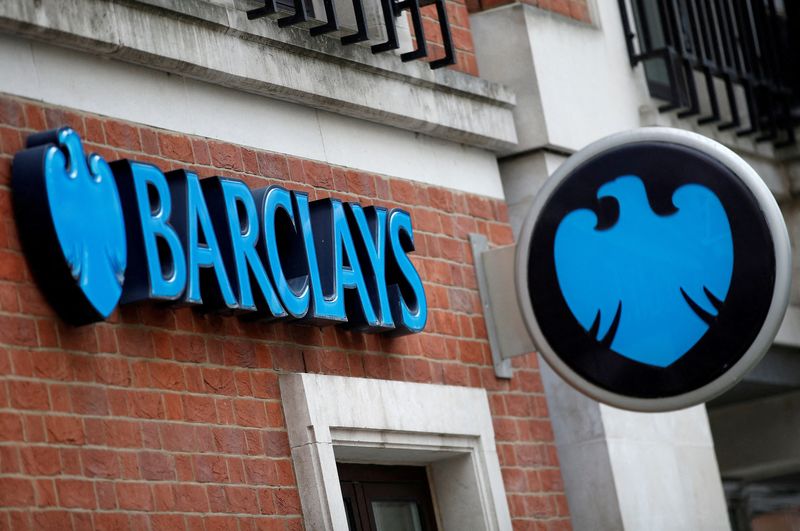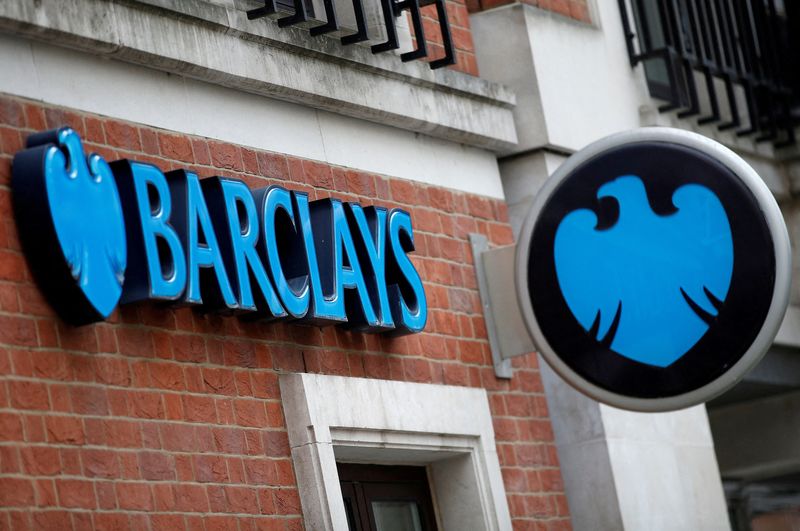Stock Markets
Analysis-Barclays maps uncertain route to a simpler, stronger future


© Reuters. FILE PHOTO: A branch of Barclays Bank is seen, in London, Britain, February 23, 2022. REUTERS/Peter Nicholls/File Photo
By Sinead Cruise, Lawrence White and Iain Withers
LONDON (Reuters) – Barclays, unveiling its biggest revamp since 2016, sought to appease investors seeking a clearer route to less volatile returns.
Yet the British lender’s plan to dedicate fewer financial resources to its investment bank is at odds with ambitions to expand in some of the unit’s higher-risk businesses, investors said.
Barclays has historically devoted much of its capital to investment banking, roiling more conservative shareholders who say other businesses posting more reliable profits have been under-invested as a result.
The bank will continue to allocate the lion’s share of its firepower to investment banking, and while a bigger push into domestic lending is broadly welcomed, some analysts and investors are unconvinced the bank can grow market share enough to meet its lofty revenue goals, against strong competition and a skittish UK economy.
Barclays’ long-awaited strategic update presented on Tuesday will have the bank return at least 10 billion pounds ($12.66 billion) to investors and reorganize into five units from the current three business lines, a move it said would create a simpler and better balanced bank.
This so-called “re-segmentation” aims to give investors greater transparency of performance in each division, unlike the previous structure which reported corporate lending and investment banking revenues together, the bank said.
In a key part of the overhaul, Barclays will reduce the share of risk-weighted assets (RWA) devoted to its investment bank to around 50% by 2026 from about 63%.
In turn, the bank plans to deploy around 30 billion pounds more to its UK consumer, corporate lending and private banking arms that generate higher returns.
“Today’s announcement from Barclays is welcome as far as it goes,” said Jeremy Hosking, founder and portfolio manager at Hosking Partners.
“But shareholders are still waiting for a diagnosis of the 15-year share price undervaluation of the bank, in particular as to whether it is cyclical or structural.”
Barclays shares rose as much as 9.4% on Tuesday and closed up 8.6% – their biggest daily gain since November 2020. In the last 12 months, they have lost over 7%, compared with a 4.2% rise in a key regional banking index
The average returns on tangible equity (RoTE) in the businesses the bank has pledged to invest in ranged from 18% to 31% in the two years to end-2023, compared with a more modest 10% at the investment bank, company figures show.
By reallocating its capital, Barclays says revenue will grow to around 30 billion by 2026 from 25.4 billion pounds in 2023.
Scepticism abounds. Many analysts and commentators said the rejig did not reflect a “de-risking” of the investment bank but rather an ambition to grow other units faster to reduce the investment bank’s outsized influence on group profit.
And with such strong competition posed by NatWest Group in British small business lending, Lloyds Banking Group (LON:) in mortgages and HSBC in corporate lending, Barclays’ big UK bet is not guaranteed to succeed.
STANDING STILL
What is more, the capital underpinning Barclays’ investment bank will still far exceed that deployed by rivals, such as BNP Paribas (OTC:) and UBS in their investment banks. Both lenders boast healthier valuations than Barclays and similarly handsome shareholder payout plans.
Within the investment bank, Barclays intends to further grow its financing business, Chief Executive C.S. Venkatakrishnan told investors on Tuesday, referring to the lucrative but potentially risky practice of lending money to large institutional clients against stocks or bonds as collateral.
Barclays has invested heavily in the business, growing revenues from 1.8 billion pounds at an undisclosed point to 2.9 billion in 2023, he said.
Analysts at Citi estimate the investment bank is expected to account for 2.7 billion pounds of the targeted 4.6 billion-pound increase in group revenues by 2026, a goal they describe as “highly ambitious”.
Those revenue goals, they say, rely on a 900 million pound bounce in the industry’s overall fee pool over the period and 1.2 billion pounds of growth in equity capital markets and advisory fees as well as additional sales to existing clients.
Other investors and analysts voiced doubts whether the plan will offer as much reassurance as executives hope.
“The buybacks will help, but the second part of the picture is growing revenue,” Sajeer Ahmed, portfolio manager at Aegon (NYSE:) Asset Management, told Reuters.
“Fund managers will treat this part of the investment case with scepticism. In particular, because it involves growing the investment bank.”
Growth will require a breakthrough in select segments, namely the buying and selling of European interest-rate products, equity derivatives and securitisation where Barclays is currently ranked outside the sector’s top five players.
Rupak Ghose, a corporate strategist and financial markets analyst, said the strategic objectives outlined by Barclays were unlikely to bolster the bank’s shares over the long term.
“This is a big return of capital but I fear a dead cat bounce,” he said.
($1 = 0.7897 pounds)
Stock Markets
Suburban Propane director Logan sells $139k in shares
Stock Markets
Stock market today: S&P 500 closes lower, but posts big weekly win
Stock Markets
TD Bank promotes Laura Nitti to retail market president role

 Forex3 years ago
Forex3 years agoForex Today: the dollar is gaining strength amid gloomy sentiment at the start of the Fed’s week

 Forex3 years ago
Forex3 years agoUnbiased review of Pocket Option broker

 Forex3 years ago
Forex3 years agoDollar to pound sterling exchange rate today: Pound plummeted to its lowest since 1985

 Forex3 years ago
Forex3 years agoHow is the Australian dollar doing today?

 Cryptocurrency3 years ago
Cryptocurrency3 years agoWhat happened in the crypto market – current events today

 World3 years ago
World3 years agoWhy are modern video games an art form?

 Commodities3 years ago
Commodities3 years agoCopper continues to fall in price on expectations of lower demand in China

 Economy3 years ago
Economy3 years agoCrude oil tankers double in price due to EU anti-Russian sanctions



























